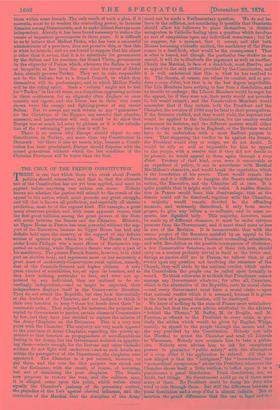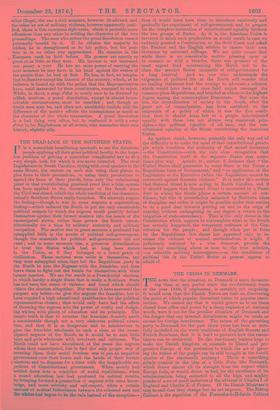THE 'CRUX OF THE FRENCH CONSTITUTION.
is one fact which those who croak about French politics should remember, and that is, that the ultimate test of the Constitution has not yet been applied, and must be applied before anything very serious can occur. Nobody knows yet whether the parties will submit to the result of the appeal to the nation which must precede any-great struggle, and till that is known all prediction, and especially all sinister prediction, must be of the vaguest kind. For example, a great many observers predict, and with some apparent reason, that the first great collision among the great powers of the State will occur between the Senate and the Chamber. Hitherto, ho Upper House in France has been powerful without the sup- port of the Executive, because no Upper House has had any definite hold upon -the country, or the support of any definite section of opinion upon which to rely. The House of Peers under Louis Philippe was a mere House of 'Eminencies sup- ported on nothing, while Napoleon's Senate was only a part bf his machinery. The present-French Senate, however, is in chief part an elective body, and represents more or less accurately a great mass of moderately-Conservative rural opinion, namely, that of the Councils-General and higher citizens. A -very great number of notabilities, too, sit upon its benches, and es they have nothing particular to fear, and were not ap- pointed by any individual, they are inclined to be et- eeedingly independent,—and as might be expected, their independence displays itself in the Conservative direotion. They do not attack the Republic, but they look distrustfully at the leaders of the Chamber, and are inclined to think it their own function to keep " those hot heads down there " in reasonable order. They rejected, for instance, the proposal ac- cepted by Government to pardon certain classes of CommuniZts by-law, and they have just decided to replace the salaries of the Army Chaplains on the Estimates. This is a very sore point with the Chamber. The majority-are very much opposed to the existence of Army Chaplains, regarding the priests ap- pointed to that function as propagandists of anti-Republican feeling in the Army, but the Government insisted on appoint- ing them—wisely enough, for the Bretons and other Catholic soldiers do not fight well unshriven—and as such details are within the prerogative of the Department, the chaplains were appointed. The Chamber in a pet refused, however, to pay them, and the vote for that purpose was struck out of the Estimates, with the result, of course, of worrying, but not of dismissing the poor chaplains. The Senate now proposes to restore the vote, and the collision may, it is alleged, come upon this point, which enlists about equally the Chamber's jealousy of its pecuniary control, the prejudice of the Left against clerical influence, and the conviction of the Marshal that the discipline of the Army must not be made a Parliamentary question. We do not be- lieve in the collision, not considering it possible that 0-ambetta should allow his followers to place -themselves in distinct antagonism to Catholic feeling upon a queZttion which involves no sort of compulsion upon any individual conscience; but let us suppose, for a moment, that it occurs, and that both Houses becoming .violently excited, the machinery of the State comes to a deadlock, what would be the consequence ? That is what is feared, and though the particular fear strikes us as unreal, it will do to-Illustrate the argument as well as another. Clearly the Marshal, in face of a dead=lock, must dissolve, and so appeal to the only arbiter provided by the Constitution, and it is well understood that this is what he has resolved to do. - The Senate, of course, Can refuse its consent, and so pro- duce a coup d'etat,-but that is -in the 'last degree improbable. The Life Members have nothing to fear from a dissolution, and no trouble to undergo ; the 'Liberal Members would be eager for the appeal, for if they were tot, their party would not prov_oke it, but would submit ; and the Conservative Members would remember that 'if they irritate both the President and the Chamber, the revision of 1880 maybe fatal to their prerogatives. If the Senators yielded, and they would yield, the supreme test would be applied to the Constitution, :for the country would pronounce its decision, and the different powers would either have to obey it, as they do in England, or the Revision would have to be -undertaken with a most Radical purpose in view. That supposing the verdict to be against the Senate, the President would obey or resign, we do not doubt. It would be silly as well as impossible -for him to appeal to the people, with a resolve that if they did not decide as he pleased, he would appeal to them again through a coup clVtat. Trickery of that kind, even were it conceivable as an expedient of policy, is not in accordance with Marshal MacMilion's character, and would break the -reputation which is the foundation 6f his power. There would remain the Senate, and it is difficult to imagine the Senate resisting the nation, the Executive, and the Chamber all at once. It is quite possible that it might wish-to resist. A sudden dissolu- tion in France would have this disadvantage, that as the Serrate could not be dissolved, together with the "Chamber, a majority would remain devoted to the offending measure, and extremely disinclined, if only from amour propre, to give way before a co-ordinate, and in some :re- spects, less dignified body. This majority, however, must be made up of different elements, it must be under extreme pressure from the 'Government, and it must stand more or less in awe Of the Revision. It is inconceivable that with the amour propre of the Senators satisfied by an appeal to the nation, with the Conservative President counselling submission, and with Revolution as the possible tonsequence of 'obstinacy, a few Conservative Senators, most of them rich men, should carry on a cbntest probably trivial in itself to the bitter end. Savage as parties still are in France, we believe -that, at all events upon any question not involving the existence of the Church, they 'will abide by the national verdict, which under the Constitution the people can be called upon 'formally to record. To think otherwise is to think that Frenchmen cannot manage any Government whatever, for after all, Cassarism, which is the alternative of the Republic, rests its moral claim —and every Government must have a moral claim-upon that national verdict which it is assumed, because it is given in the form of a general election, will be disobeyed.
We know of nothing in the state of France more satisfactory than the fact that the worst advice attributed to the advisers " behind the Throne," M. Buffet, M. de Broglie, and M. Fourtou, as offered to the President in every crisis, is pre- cisely the advice which would be given by English Whigs, namely, to appeal to the people through the means and in the way provided by the Constitution. Nobody now tells the Marshal to arrest the Chamber and send all Liberals to Vincennes. Nobody now counsels him to take a plebis- cite. Nobody even advises him to ask for exceptional powers .to guarantee "public safety," with the alternative of a coup d'e'tat if the application be refused. All that is now alleged is that the " intriguers," the " incendiaries," the " monarchical conspirators " advise the President, whenever the Chamber shows itself a little restless;to inflict upon it as a punishment a penal dissolution. Penal dissolutions are, no doubt, bad things. No Government could go on if there were many of them. No President could be doing his duty who tried to rule through them. But still the difference between a penal dissolution and -a coup d'etat is almost infinite. Not to mention the grand differences that the one is legal and th other illegal, the one a civil measure, however ill-advised, and the other an act of military violence, however apparently justi- fied, there is this enormous diferentia, which is probably more efficacious than any other in settling the character of the two proceedings. The man who orders the penal dissolution cannot personally benefit by it. If he obtains the majority he wishes, he is strengthened as to his policy, but his posi- tion is in no other way aggrandised. He remains in the - European rank he held before. His powers are exactly as great or as little as they were. His income is not increased one penny a year. He has no more power of carrying the next measure he may have in his head against the wishes of the people than he had at first. He has, in fact, no tempta- tion to dissolve except the interest of the country, which, as he believes, is bound up with the policy that the Representatives have, until instructed by their constituents, ventured to reject. While, in short, a coup d'Itat is nearly sure to be dictated by selfish motives, a penal dissolution, except in almost incon- ceivable circumstances, must be unselfish ; and though no doubt men may be, and often are, unselfishly foolish, still the difference of the motive affects the consequences as much as the character of the whole transaction. A penal dissolution is a bad thing very often, but to confound it with a coup d'etat is, for Englishmen at all events, who remember their own history„ slightly silly.



































 Previous page
Previous page